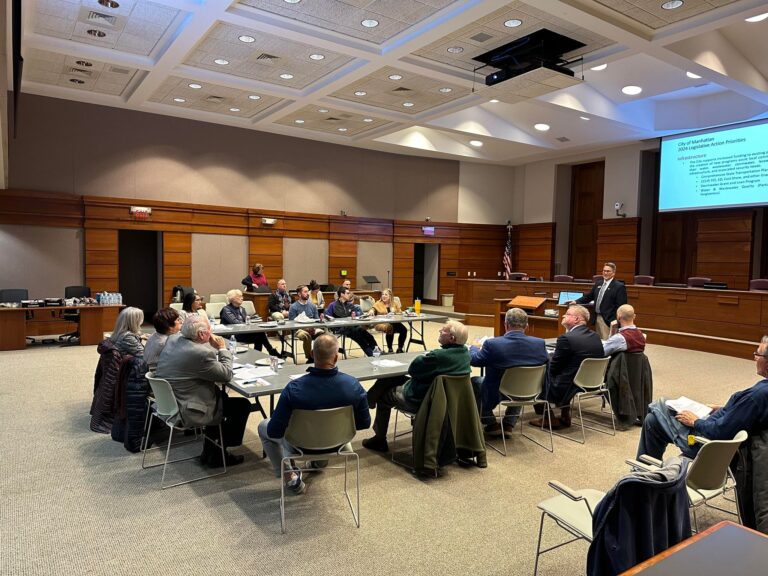Manhattan City officials hosted area legislators for a luncheon Friday to discuss some of the key issues the city is prioritizing in 2024
Dark Store Theory
The Dark Store Theory is complex, but at it’s root level, is a tactic used by corporations to have their properties assessed as if the store were closed and empty. This would force a building to be taxed based on pure market value of the location instead of the amount of profit generated by the location.
Recent Dark Store controversies have involved Walmart in Overland Park. 51st District Representative Kenny Titus (R-Manhattan) says the concept has been discussed in nearly every community around the area.
“I hear about it from all of the municipalities in the area. Pottawatomie County is worried about it, Riley County and Manhattan are worried about it. The problem is it’s been this back and forth between the Board of Tax Appeals (BOTA) to the Court of Appeals back to BOTA. There’s a settlement with Johnson County,” he said.
Despite the continued stand still, Titus says it is important to find a solution in the near future.
“It’s just still a little murky in the legal process of where things stand, but I think if we don’t get that clarified relatively soon, I think there will be an imperative for the legislature to clarify how that should be applied. It makes sense the store should be taxed at how they’re used,” he said.
Sales Tax and Revenue (STAR) Bond Districts
STAR bonds are a mechanism through which cities can divert largely state shares of sales tax collections from a specified district for a period of time into redevelopment and tourism-generating projects. The Manhattan STAR District stretches from the area surrounding the Flint Hills Discovery Center and new Museum of Art and Light to the to the shopping center that includes Hy-Vee.
At issue is the reduction of state sales tax on food from 4% to 2% this year, which could impact revenues coming into the district, which the city says has been promised will be made whole by the Kansas Department of Commerce. The city would like for that to spelled out in policy for its unique district.
As the food sales tax comes down, Titus says he believes they have to monitor the taxes that come in closely as projections are currently over $1 million over projection collection on the sales tax.
“If we get to a point where there is an actual shortfall in collections, I think we can have a discussion about that. But until we actually see if these STAR bond districts are failing to meet their projections and there’s a danger of the bonds not being paid off, I’m hesitant to draw in other general tax funds,” he said.
City officials also called on legislators for state financial support for technical colleges. The city also shared concerns about legislative proposals for property tax exemptions for certain businesses competing against government entities. This stems from action last year from the Kansas Senate to give a tax break to Wichita area Genesis Health Clubs. The measure was not adopted but may be up for consideration this session. The City of Manhattan is not in favor of the bill.
The Kansas Legislature convenes for the 2024 session beginning Monday in Topeka.


